1. Freshdata, 2020-2022, (Funded by TUBITAK)
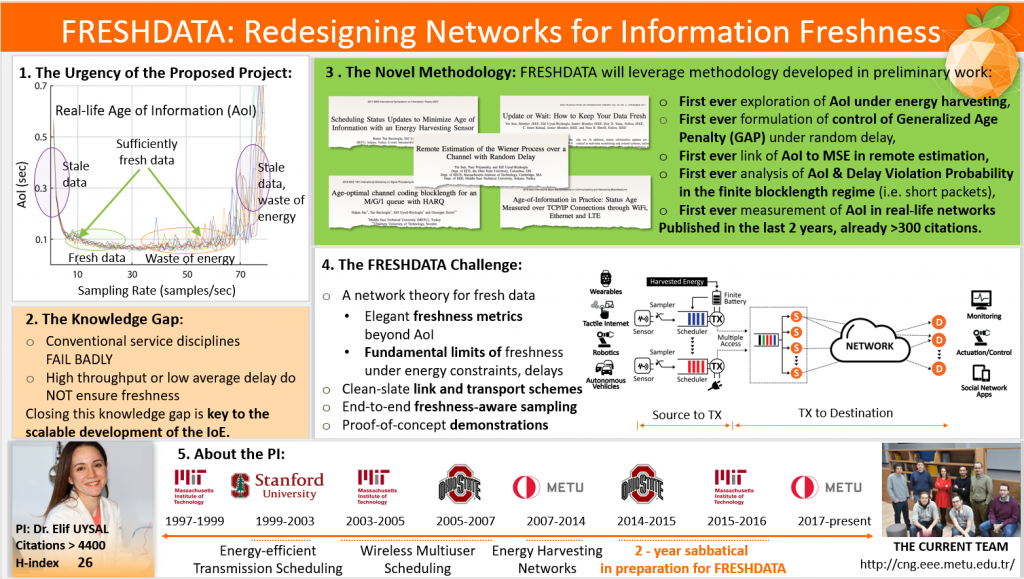
- Project name: Redesigning Networking for Information Freshness FRESHDATA
- Principal Investigator: Prof. Elif Uysal
- Project Duration: July 1, 2020-July 1, 2022
- Host Institution: Middle East Technical University (METU)
The Internet will soon be dominated by nodes using Machine-Type Communications (MTC) (e.g., industrial control, autonomous vehicles, social network apps). The key performance metric for MTC is sufficiently timely data, i.e., freshness of status updates. However, current networks have been optimized for maximizing throughput for a moderate number of high rate connections. So, how to re-architect networks to provide fresh information to an explosive number of status-update flows? This is a major challenge as classical network theory does not even have tools to address information freshness.
Age of Information (AoI) is a recently popularized metric for information freshness. The PI contributed to the original solution of controlling generalized AoI penalty under random delay or energy constraints. Our work revealed that, contrary to conventional wisdom, an age-optimal policy neither transmits at the highest possible rate nor requires the smallest end- to-end delay. We also showed how freshness-aware sampling of a stochastic process can improve accuracy of remote monitoring several-fold compared to uniform sampling. These results motivate a paradigm shift in re-engineering networks for MTC, based on AoI and more advanced freshness metrics to replace traditional performance indicators such as throughput or delay.
Propelled by these game-changing revelations, FRESHDATA will develop the theory of freshness-optimal network design through clean-slate formulations that innovate across network layers. Fundamental trade-offs between freshness, energy and reliability will be characterized. Revolutionary sampling, transmission and service policies for information flows will be devised. We also take on the challenge of demonstrating the impact of our new technologies on real-world IoT implementations. We envision the impact to reach beyond the communication networks research area, and influence the interface with control, robotics and data analytics, the main end users of MTC.
2. AoI In Future Networks, 2019-2020, (Funded by Huawei)

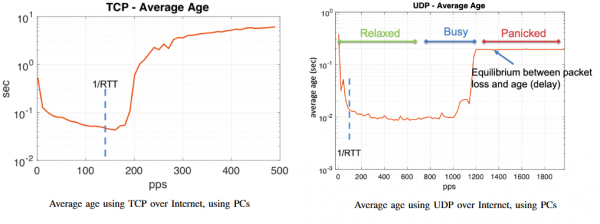
- Project name: AoI In Future Networks
- Principal Investigator: Prof. Elif Uysal
- Project Duration: January 2019-December 2020
We are witnessing a significant change in the structure and quality requirements of data that is transported on communication networks. Technologies such as control and monitoring systems that run on the Internet, cellular and ad-hoc networks, applications running on social networks, environmental monitoring algorithms of autonomous vehicles, as well as automated decision making in health and finance depend on sufficiently frequent updates (data packets bearing new samples/measurements/data). The proposed project aims to develop techniques and algorithms that approach
| Publications |
 |
AoI Events of Our Research Group
- Weekly Group meeting, Wednesdays or Fridays at 17:30
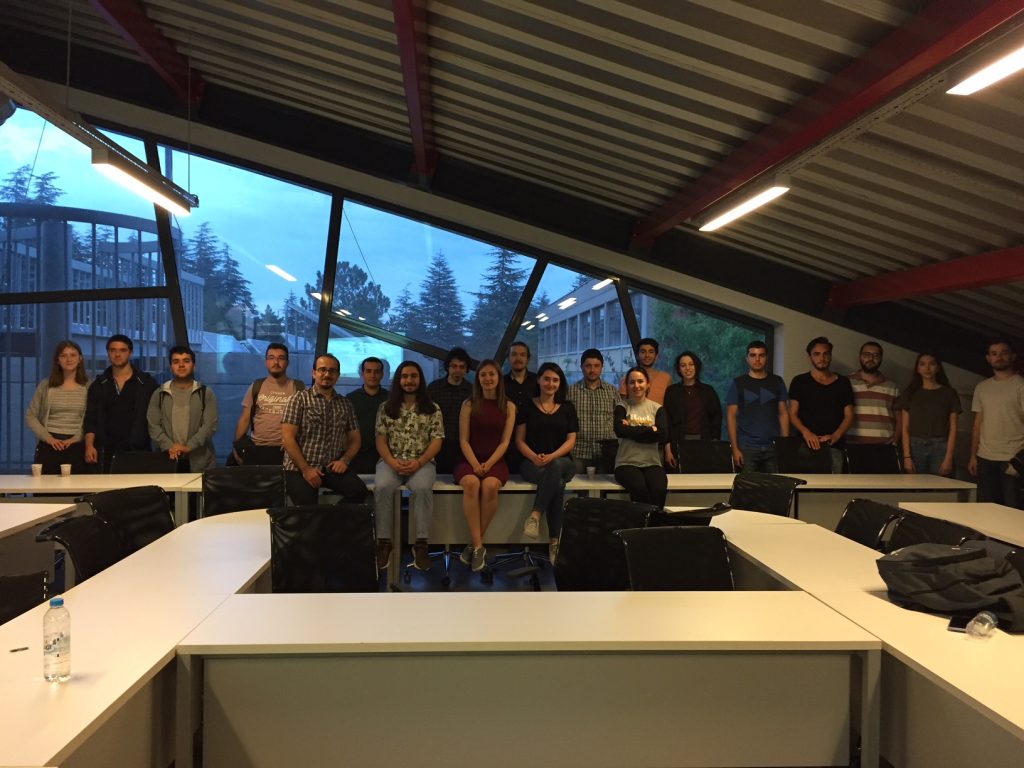
- Our “Optimal Status Updating with a Finite-Battery Energy Harvesting Source” published in JCN – Journal of Communication and Networks. [Download paper]
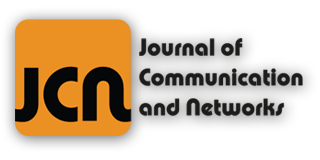
- Our “Towards AoI-aware Smart IoT Systems” paper will be presented in the 2020 International Workshop on Computing, Networking and Communications (CNC), Big Island, Hawaii, USA.

- Our research group met with Prof. Yin Sun during the IEEE PIMRC 2019 Symposium in Istanbul, Turkey.
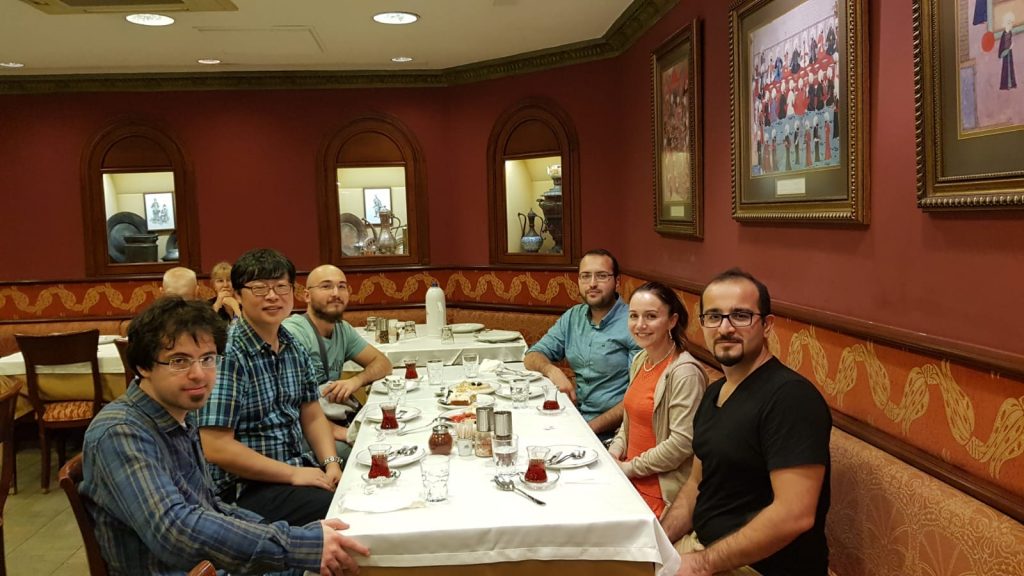
- We presents our recent works at Fifth London Symposium on Information Theory (LSIT) 2019. [click here to see Poster]
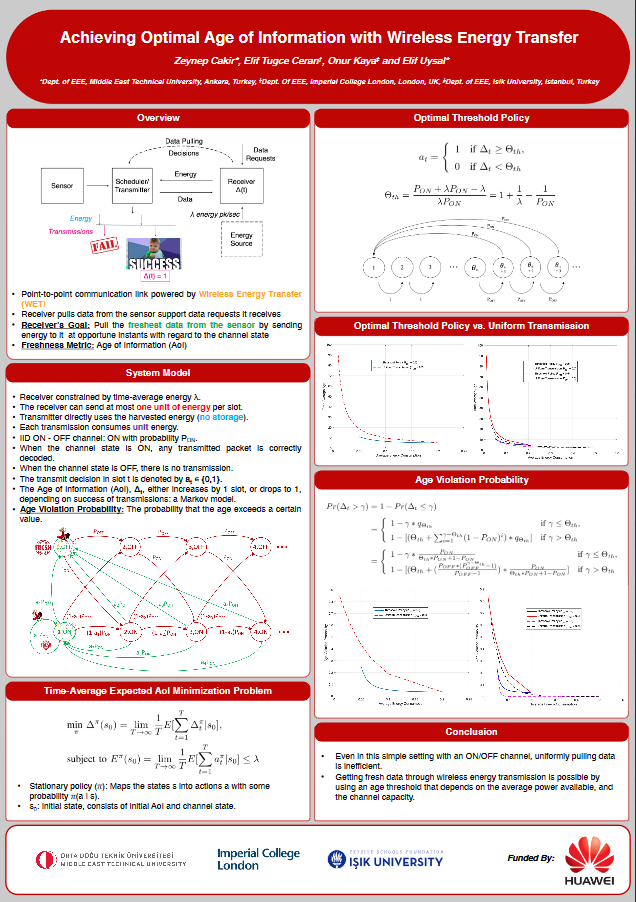
- We were invited to presenterd our recent works at 2nd AoI Workshop, INFOCOM 2019, Paris, France. [click here to see Poster]
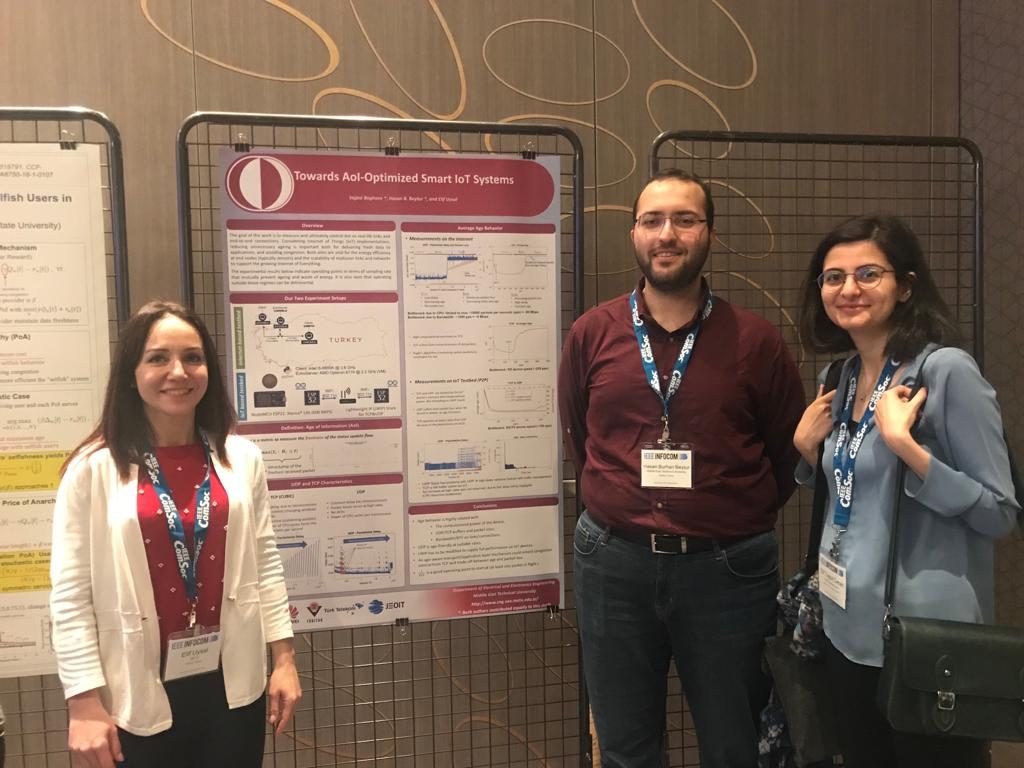
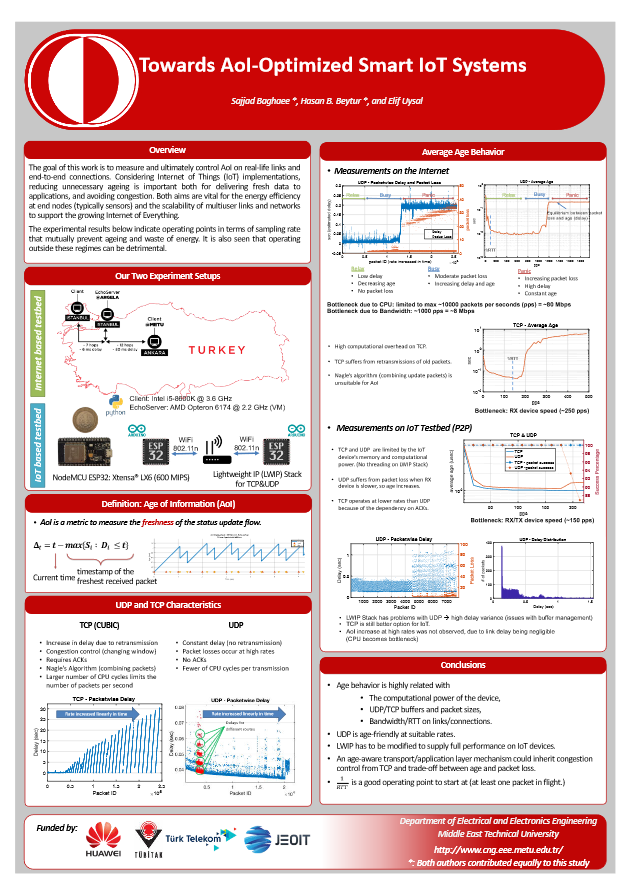
- We presented the paper “Measuring Age of Information on Real-Life Connections” in 27th Signal Processing and Communications Applications Conference (SIU2019), Sivas, Turkey. [Download paper]

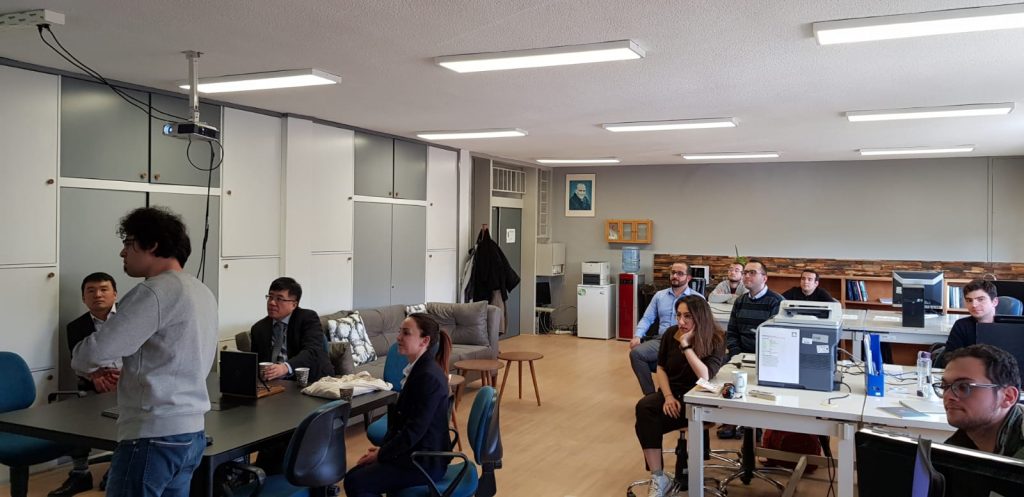
3. Sampling and Scheduling for Optimal Age of Information, 2018-2021, (Funded by TUBITAK)
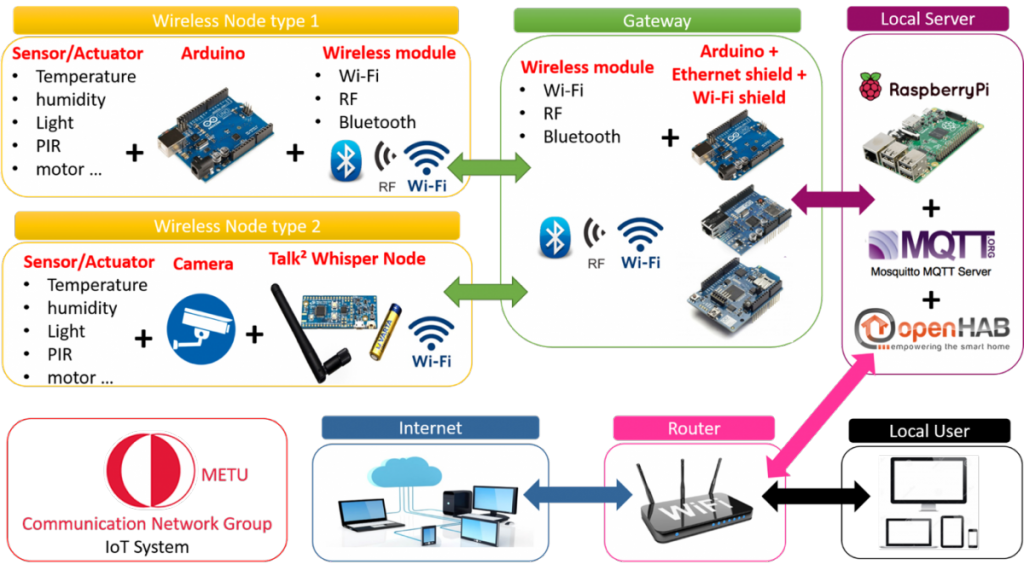
- Project name: Sampling and Scheduling for Optimal Age of Information
- Project Coordinator: Prof. Elif Uysal
- Collaborators: Eytan Modiano, Yin Sun
- Project Duration: 36 Months
- Project Start Date: March 2018
- Funded Personnel: Postdoctoral researcher (12 mo), 2 full-time RAs (36 mo, 12 mo), 2 undergraduates (24 mo, 12 mo)
- Funded by TUBITAK grant 117E215
We are witnessing a significant change in the structure and quality requirements of data that is transported on communication networks. Technologies such as control and monitoring systems that run on the Internet, cellular and ad-hoc networks, applications running on social networks, environmental monitoring algorithms of autonomous vehicles, as well as automated decision making in health and finance depend on sufficiently frequent updates (data packets bearing new samples/measurements/data). The proposed project aims to develop techniques and algorithms that approach
A common performance criterion for applications that depend on updates is how fresh the data at the node that processes the data and forms decisions is. On the other hand, traditionally, optimal design of data networks has been centered on the analysis of throughput and delay. However, results in recent literature have shown that transmission policies that may be optimal in terms of throughput or delay may be sub-optimal in terms of achieving data freshness.
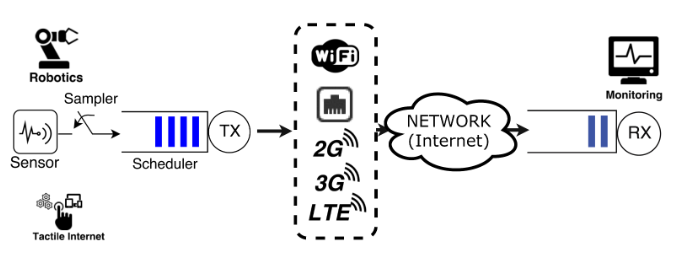
Age of Information is defined as the amount of time that has elapsed since the most recent update that has been received by the source was generated/sampled at the source, in other words, it expresses how old the newest update at the receiver is.
The proposed project contains work in three main thrusts. The first is AoI optimal scheduling in single server and multi server queuing models. The second is real time sampling. In preliminary work leading to this project, it has been observed that increasing sampling rate does not always lead to reduction in Age, on the contrary it may sometimes increase it. We will develop a sampling theory for optimizing not only age but also error for remote estimation over a network.
The third stage is implementation and demonstration, that uses a variety of sensors that will collect and sample various physical disturbances (e.g. temperature, humidity, acceleration, motion, image). Wireless access points will collect and forward the data captured by the sensors and send it over the Internet to be processed by an application software, and be used for a remote control/automation system.
Among the expected outputs of the project, the first is groundbreaking scientific contributions in the form of theoretical limits for AoI, optimal sampling in the presence of network delay, and algorithms that approach these limits. The project will include collaboration with MIT and Ohio State University researchers.



Turkish
- Proje Adı: Optimal Bilgi Yaşı için Veri Örnekleme ve Çizelgeleme (BASARI_OYKUSU)
- Proje Yürütücüsü: Prof. Dr. Elif Uysal
- Proje Süresi: 36 Ay.
- Proje Başlangıcı: Ekim 2017
- Desteklenen Personel: Doktora sonrası araştırmacı (12 ay), 2 tam zamanlı doktora öğrencisi araştırmacı (36 ay, 12 ay), 2 lisans bursiyeri (24 ay, 12 ay)
- Destek: TUBİTAK 1001 programı (proje no. 117E215)
Haberleşme ağları üzerinde gönderilen veri paketlerinin türü ve gereksinimlerinde ciddi değişimler olmaktadır. Internet üzerinden veri gönderen kablosuz kontrol ve izleme sistemleri, sosyal ağlar üzerinde çalışan uygulamalar, otonom taşıtlar, sağlık takibi, finans gibi alanlarda karar vermek için kullanılan otomasyon yazılımları, Eşyaların Interneti vb. teknolojiler, başarılı çalışmak için yeterli sıklıkta gönderilen “güncellemelere” (yeni örnek/ölçüm/bilgi içeren paketlere) gereksinim duymaktadır.
Güncellemeye dayanan uygulamalar için verinin işlendiği ve kararların verildiği noktadaki bilginin yeterince taze oluşu önemlidir. Ancak, veri ağlarının optimal tasarımı için geleneksel olarak analiz edilen iki başarım kriteri, veri akış hızı ve gecikmedir. Gecikme ve akış hızı ölçütleri bakımından en iyi gönderim yöntemlerinin Bilgi Yaşı (BY) bakımından en iyi olmayabileceği son 2-3 yıldaki literatürde gösterilmiştir.
2015 yılında başlayan çalışmalarımız ilk defa olarak gecikme altında BY’yi optimize eden iletim yöntemleri bulmak ve ilk defa olarak enerji kısıtları altında optimal BYnin nasıl elde edileceğini göstermek bakımından literatüre öncülük etmiştir. Bu projede temel sonuçlar geliştirilecektir: çok kullanıcının güncelleme paketlerinin kablosuz erişim ortamında en doğru zamanda oluşturulması ve iletilmesi teorisi, stokastik süreçlerin Internet üzerinden uzaktan takibi için örneklenmesinde, en az hatayı verecek örnekleme teorisi geliştirilecektir. Ayrıca, ağ gecikme ve bilgi yaşı farkındalığı ile güncelleme gönderen uygulamaların dünyadaki ilk deneysel uygulamalarından biri gerçekleştirilecektir.
4. E-CROPS— Energy Harvesting Communication Networks: Optimization and Demonstration, 2012-2015, (Funded by CHIST-ERA)
This project won a grant through the CHIST-ERA program of ERA-NET (2012-2015). It is a collaboration between METU, Imperial College (UK), Eurecom (France) and CTTC (Spain). METU is heavily involved in the theoretical workpackages and has full leadership of the demonstration workpackage. In the demonstration WP, our group is collaborating with the MEMS group.

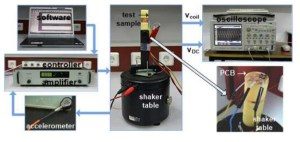
5. Implementable Schemes for Energy Harvesting Communication Systems, 2012-2013, (Funded by Türk Telekom)
6. Principles and Experimental Implementation toward Energy-Efficient Design of Wireless Networks, 2011-2013, (Funded by TUBITAK)
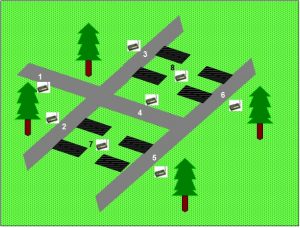
7. Design of Minimum Energy High Performance Wireless Communication Networks: Inter-layer Optimization and Algorithms, (Funded by TUBITAK)
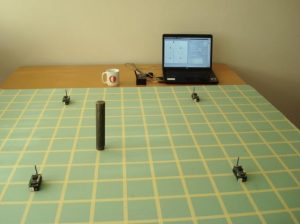
8. Novel Transmission Techniques for Energy Harvesting Communication Systems, 2011-2012, (Funded by Türk Telekom)

